表示感觉和知觉的系动词
表示感觉和知觉的系动词的用法
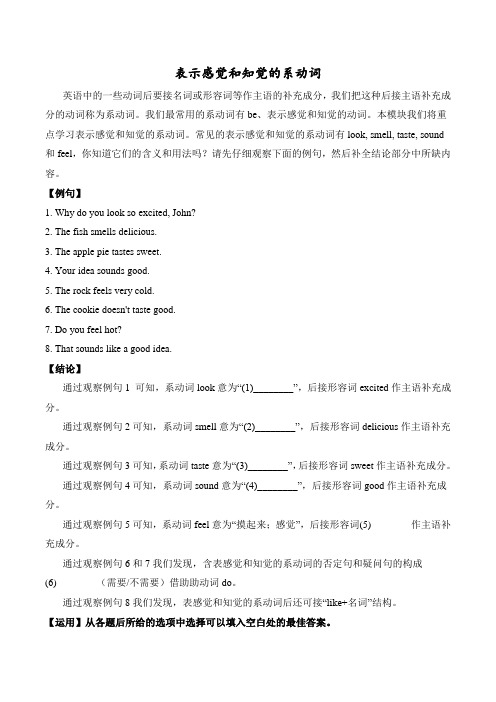
表示感觉和知觉的系动词英语中的一些动词后要接名词或形容词等作主语的补充成分,我们把这种后接主语补充成分的动词称为系动词。
我们最常用的系动词有be、表示感觉和知觉的动词。
本模块我们将重点学习表示感觉和知觉的系动词。
常见的表示感觉和知觉的系动词有look, smell, taste, sound和feel,你知道它们的含义和用法吗?请先仔细观察下面的例句,然后补全结论部分中所缺内容。
【例句】1. Why do you look so excited, John?2. The fish smells delicious.3. The apple pie tastes sweet.4. Your idea sounds good.5. The rock feels very cold.6. The cookie doesn't taste good.7. Do you feel hot?8. That sounds like a good idea.【结论】通过观察例句1 可知,系动词look意为“(1)________”,后接形容词excited作主语补充成分。
通过观察例句2可知,系动词smell意为“(2)________”,后接形容词delicious作主语补充成分。
通过观察例句3可知,系动词taste意为“(3)________”,后接形容词sweet作主语补充成分。
通过观察例句4可知,系动词sound意为“(4)________”,后接形容词good作主语补充成分。
通过观察例句5可知,系动词feel意为“摸起来;感觉”,后接形容词(5)________作主语补充成分。
通过观察例句6和7我们发现,含表感觉和知觉的系动词的否定句和疑问句的构成(6)________(需要/不需要)借助助动词do。
通过观察例句8我们发现,表感觉和知觉的系动词后还可接“like+名词”结构。
【运用】从各题后所给的选项中选择可以填入空白处的最佳答案。
Module 1【刷语法】感觉和知觉的系动词
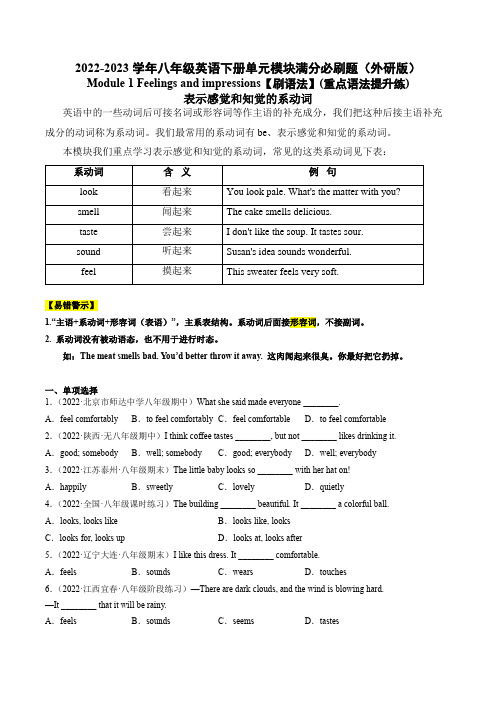
2022-2023学年八年级英语下册单元模块满分必刷题(外研版)Module 1 Feelings and impressions【刷语法】(重点语法提升练)表示感觉和知觉的系动词英语中的一些动词后可接名词或形容词等作主语的补充成分,我们把这种后接主语补充成分的动词称为系动词。
我们最常用的系动词有be、表示感觉和知觉的系动词。
本模块我们重点学习表示感觉和知觉的系动词,常见的这类系动词见下表:【易错警示】1.“主语+系动词+形容词(表语)”,主系表结构。
系动词后面接形容词,不接副词。
2. 系动词没有被动语态,也不用于进行时态。
如:The meat smells bad. You’d better throw it away. 这肉闻起来很臭。
你最好把它扔掉。
一、单项选择1.(2022·北京市师达中学八年级期中)What she said made everyone ________.A.feel comfortably B.to feel comfortably C.feel comfortable D.to feel comfortable 2.(2022·陕西·无八年级期中)I think coffee tastes ________, but not ________ likes drinking it. A.good; somebody B.well; somebody C.good; everybody D.well; everybody 3.(2022·江苏泰州·八年级期末)The little baby looks so ________ with her hat on!A.happily B.sweetly C.lovely D.quietly4.(2022·全国·八年级课时练习)The building ________ beautiful. It ________ a colorful ball.A.looks, looks like B.looks like, looksC.looks for, looks up D.looks at, looks after5.(2022·辽宁大连·八年级期末)I like this dress. It ________ comfortable.A.feels B.sounds C.wears D.touches6.(2022·江西宜春·八年级阶段练习)—There are dark clouds, and the wind is blowing hard.—It ________ that it will be rainy.A.feels B.sounds C.seems D.tastes7.Dick’s crazy about this song. He thinks nothing else sounds ________.A.as nicely as it B.as nice as it C.more nicely than it D.more nice than it8.(2022·全国·八年级课时练习)—The oranges ________ sweet.—Of course. They are from Yongxing, Chenzhou.A.taste B.eat C.drink D.smell9.(2022·全国·八年级课时练习)Their story ________ so interesting and exciting.A.hears B.looks C.sounds D.smells10.(2022·北京西城·八年级期末)— Tim, have you ever heard the song Together for a Shared Future?— Yes, it ________ beautiful.A.smells B.sounds C.feels D.looks11.(2022·山东·济南市天桥区教育教学研究中心中学教研科八年级期末)—What do you think of the Toms’ music?— Oh, the Toms’ music ________ more like rock.A.sees B.looks C.smells D.sounds12.(2022·辽宁大连·八年级期末)— It ________ crazy, but I don’t know what to take. I’m leaving tomorrow.— Don’t worry. Let me help you.A.sounds B.looks C.feels D.tastes13.(2022·上海·八年级单元测试)—Why do you ________ very happy this afternoon?—Because we are going to spend the evening at Lily’s house.A.look B.sound C.taste D.smell14.(2022·上海·八年级单元测试)—You ________ pale. Are you feeling all right?—I’m OK. Don’t worry.A.look B.taste C.smell D.sound15.(2022·上海·八年级单元测试)—Hi, madam. Would you like this silk dress? It ________ soft and smooth. —OK. Let me try it on.A.sounds B.feels C.becomes D.smells16.(2022·上海·八年级单元测试)—Let’s go swimming this afternoon.—That sounds ________. I like swimming very much.A.good B.well C.bad D.badly17.(2022·上海·八年级单元测试)The food there doesn’t taste as good as it ________. Don’t eat only with your eyes.A.smells B.is smelt C.looks D.is looked18.(2022·上海·八年级单元测试)The cakes in the restaurant ________, so they ________ well.A.are tasted well; sell B.are tasted good; are soldC.taste terrible; sell D.taste good; sell19.The soup tastes ________ because it’s too salty. I put salt into it too ________ in a hurry.A.terribly; carefully B.terrible; careful C.terrible; carelessly D.terribly; careless 20.(2021·云南·华坪县教育科学研究中心八年级期末)—How nice the cakes ________! They must be delicious.—Let’s buy some if you want to eat.A.feel B.smell C.taste D.sound21.(2021·山东菏泽·八年级期中)The old man is still living ________, but he never feels ________. A.lonely, alone B.alone, lonely C.lonely, lonely22.—Do you like the beautiful flower?— Yes, it ________ sweet.A.is smelling B.smells C.smelt D.is smelt23.Your phone ________ exactly like mine.A.is look B.looking C.is looked D.looks24.This kind of fruit looks ________, but it doesn't taste ________.A.good;well B.well;good C.good;good D.well;well25.—How was your grandpa this morning?—He looked ________ .A.happy B.happily C.to be happy D.to be happily二、用所给单词的正确形式填空26.We all think classical music _________ (sound) ________(wonder).27.(2022·辽宁大连·八年级期末)Mmm... the pie _______ (smell) delicious!28.(2022·上海市第四中学八年级阶段练习)Jack looked ________ as he didn’t know what to do then. (puzzle) 29.The soup tastes very _______ (well).30.Linda often feels ________ (excite) when she listens to rock music.31.Listen! How terrible the wind ______________(sound)!32.The fish ________(taste)delicious. Would you like some more?33.This bed _________ (feel) very soft and comfortable.34.She ________ (feel) very sad yesterday. What happened to her?35.My sister does not ________ (look) well. She has to go to see a doctor.四、多句选词填空—I think it will ________ nice on you.37.What a beautiful song! It ________ so sweet.38.Mom is making dinner. It ________ so nice!39.This kind of cloth ________ soft. Where did you buy it?40.—I can't stand the smell of the stinking tofu (臭豆腐).—Would you like to have a try? It ________ quite delicious!参考答案:1.C【详解】句意:她的话让每个人都觉得很舒服。
集宁区第二中学八年级英语下册 Module 1 Feelings and impressions U

Does it smell fresh? 它闻起来新鲜吗? I don’t feel well today. 今天我感觉不好。(well指身体〞好”时是形容词。) Do they look happy? 他们看上去高兴吗?
【语法强化·练] Ⅰ. 选词填空 feel, sound, look, smell, taste
The Nicest Teacher In My Heart
Reason(原因)
do a good job/ be strict with/ be like a mother/encourage
其他
...
要求: 1. 内容可参考表格中的要点并适当发挥; 2. 语句通顺, 意思连贯, 书写工整; 不得出现真实信息; 3. 词数不少于80。
Best wishes!
Yours, Lili
【练·话题写作] (2018·怀化中考) 每个人的一生中都会有令自己
难忘的人。回想一下自己的成长过程, 対你影响最深 的老师是谁? 请你根据以下要点提示, 以〞The Nicest Teacher In My Heart”为题, 写一篇英语短文。
The Nicest Teacher In My Heart
1. —Why not go fishing this afternoon? —That _so_u_n__d_s good. 2. The dress _fe_e_l_s very soft. I’ll take it. 3. The watermelon looks good and it _ta_s_t_e_s very sweet. 4. It _s_m_e_l_ls_ nice! What are you cooking, Dad? 5. Kevin _lo_o_k_e_d_ sad yesterday. What was wrong with him?
中考英语专题复习--连系动词look、sound、smell、taste和feel的用法

中考英语专题复习--连系动词look、sound、smell、taste和feel的用法look, sound, smell, taste 和feel它们都属于表示知觉的连系动词。
look的意思:“看起来”、sound的意思:“听起来”、smell的意思:“闻起来”、taste的意思:“尝起来”、feel的意思“摸起来”。
使用时注意以下几点:(1) 通常以物作主语,表示人的知觉状态或感觉能力,虽有被动词味,但不用被动语态。
如:误:The stone is felt smooth.这种石头摸上去很光滑。
正:The stone feels smooth.误:The soup is tasted delicious.这汤味道不错。
正:The soup tastes delicious.(2) 其后均可接like短语。
如:That photograph doesn't look like her at all.那张照片看起来一点都不像她。
This tastes like an orange.这东西吃起来像桔子。
When I realized what stupid mistake I had made, I felt like a fool.当我发现我犯了个愚蠢的错误是,我觉得仿佛是个傻子。
(3) 除look外,均不能接to be,也均不用于进行时态(即使是look 也不多见)。
如:She looks (to be) the right person for this job.她似乎是做这项工作的合适人选。
You look / are looking very fetching in that hat with the purple dress.你戴上那顶帽子配上这紫色衣服显得非常动人。
(4) taste和smell常与of连用,意为“有┅的味道”。
如:The room smelt of cigarettes.房间里有烟味。
圣城中学八年级英语感官动词
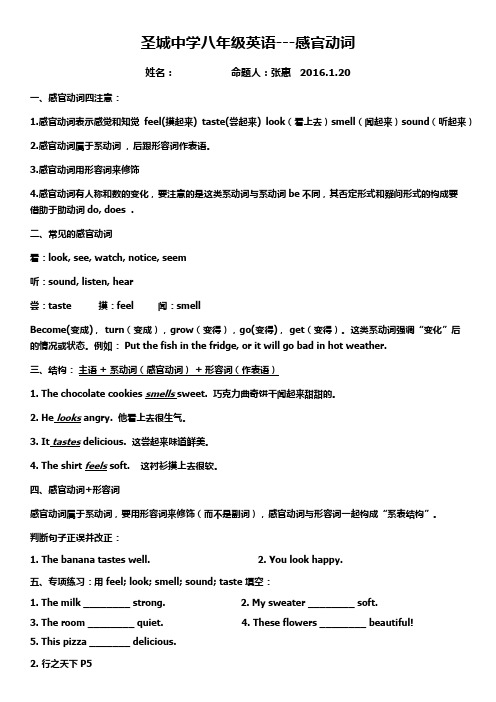
圣城中学八年级英语---感官动词姓名:命题人:张惠 2016.1.20一、感官动词四注意:1.感官动词表示感觉和知觉feel(摸起来) taste(尝起来) look(看上去)smell(闻起来)sound(听起来)2.感官动词属于系动词,后跟形容词作表语。
3.感官动词用形容词来修饰4.感官动词有人称和数的变化,要注意的是这类系动词与系动词be不同,其否定形式和疑问形式的构成要借助于助动词do, does .二、常见的感官动词看:look, see, watch, notice, seem听:sound, listen, hear尝:taste 摸:feel 闻:smellBecome(变成), turn(变成),grow(变得),go(变得), get(变得)。
这类系动词强调“变化”后的情况或状态。
例如: Put the fish in the fridge, or it will go bad in hot weather.三、结构:主语 + 系动词(感官动词) + 形容词(作表语)1. The chocolate cookies smells sweet. 巧克力曲奇饼干闻起来甜甜的。
2. He looks angry. 他看上去很生气。
3. It tastes delicious. 这尝起来味道鲜美。
4. The shirt feels soft. 这衬衫摸上去很软。
四、感官动词+形容词感官动词属于系动词,要用形容词来修饰(而不是副词),感官动词与形容词一起构成“系表结构”。
判断句子正误并改正:1. The banana tastes well.2. You look happy.五、专项练习:用 feel; look; smell; sound; taste 填空:1. The milk ________ strong.2. My sweater ________ soft.3. The room ________ quiet.4. These flowers ________ beautiful!5. This pizza _______ delicious.2. 行之天下P5。
初中英语语法专题---感官动词(共15张PPT)

模块语法聚焦一
( )11.—Do you like swimming in winter? —Of course. The water ________ a bit cold at first, but then I am warm and full of energy. A.tastes B.feels C.smells D.looks ( )12.Mum is making dinner. It ________ so nice! A.smells B.tastes C.feels D.sounds
He looks tired.
他看起来累了。
These flowers smell sweet.
这些花闻起来香。
模块语法聚焦一
Her voice sounds beautiful. 她的声音听起来优美。 The cake tastes delicious.蛋糕尝起来美味。 I felt guilty.我感到内疚。 3.感官动词后可接介词like, like后可接名词或v.ing 形式。例如: That boat looks like a duck. 那条船看起来像一只鸭子。 It smells like being burnt.它闻起来像烧焦了一样。
[答案] 13D,14C,15C
模块语法聚焦一
Ⅱ.根据汉语意思完成句子 1.我的毛衣摸起来柔软。 My sweater ___f_e_e_l_s_s_o__ft_. 2.聚会听起来太吵了。 The party __s_o_u_n_d_s__n_o_i_s_y_______. 3.你妈妈看上去很年轻。 Your mother _____L_o_o_k_s__y_o_u_n_g_______. 4.汤尝起来咸了。 The soup ____T_a_s_t_e_s__s_a_l_t_y____. 5.它闻起来新鲜吗? __D_o_e_s__ it __s_m_e_l_l___f_r_e_s_h__?
外研八年级下M1U3 表感觉知觉的系动词

D 5. Mum, what are you cooking? It _______ so sweet. (2014安徽) A. tastes B. feels C. sounds D. smells
C and it sells ______. 6. The bread smells ______ (2014黔西南州) A. well; good B. good; good C. good; well D. well; well
4. What’s he / she like? 他/ 她长什么样子? Circle them. 把符合的选项圈起来。 A. He / She is tall / short. B. He / She has big / small eyes and a big / small nose. 5. What’s his / her hobby?他/ 她的兴趣是什 么? Circle them.把符合的选项圈起来。 A. He / She likes listening to music. B. He / She likes playing basketball / soccer / tennis.
6. What do you do together? Circle them.把符合的选项圈起来。 A. We often go to school together. B. I often play with him / her. Step Two: Put the sentences into an article. 1. Put your answers together. His name is Mike. He is friendly and hardworking. He is 11 years old. He is tall and he has big blue eyes. He likes playing soccer. We often study and play together.
1感官系动词讲解与练习
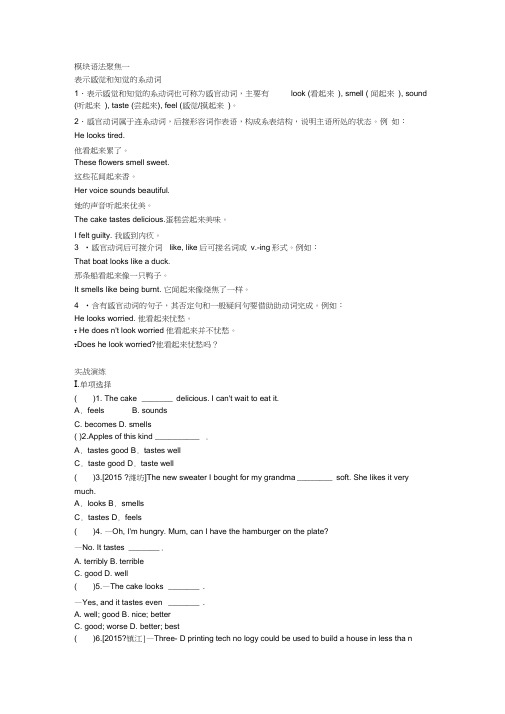
模块语法聚焦一表示感觉和知觉的系动词1.表示感觉和知觉的系动词也可称为感官动词,主要有look (看起来), smell ( 闻起来), sound (听起来), taste (尝起来), feel (感觉/摸起来)。
2.感官动词属于连系动词,后接形容词作表语,构成系表结构,说明主语所处的状态。
例如:He looks tired.他看起来累了。
These flowers smell sweet.这些花闻起来香。
Her voice sounds beautiful.她的声音听起来优美。
The cake tastes delicious.蛋糕尝起来美味。
I felt guilty. 我感到内疚。
3 •感官动词后可接介词like, like后可接名词或v.-ing形式。
例如:That boat looks like a duck.那条船看起来像一只鸭子。
It smells like being burnt. 它闻起来像烧焦了一样。
4 •含有感官动词的句子,其否定句和一般疑问句要借助助动词完成。
例如:He looks worried. 他看起来忧愁。
T He does n't look worried 他看起来并不忧愁。
T Does he look worried?他看起来忧愁吗?实战演练I.单项选择( )1. The cake _______ delicious. I can't wait to eat it.A. feelsB. soundsC. becomesD. smells( )2.Apples of this kind __________ .A. tastes goodB. tastes wellC. taste goodD. taste well( )3.[2015 ?潍坊]The new sweater I bought for my grandma ________ soft. She likes it very much.A. looksB. smellsC. tastesD. feels( )4. —Oh, I'm hungry. Mum, can I have the hamburger on the plate?—No. It tastes _______ .A. terriblyB. terribleC. goodD. well( )5.—The cake looks _______ .—Yes, and it tastes even _______ .A. well; goodB. nice; betterC. good; worseD. better; best( )6.[2015?镇江]—Three- D printing tech no logy could be used to build a house in less tha n24 hours.—It ______ amazing. It's my first time to get to know the news.A.looks B.smells C.sounds D.tastes( )7.Oh, it ___________so nice. What beautiful music it is!A.smells B.soundsC.tastes D.looks( )8.—Dinner is ready. Help yourself!—Wow! It ______ delicious. You are really good at cooking.A.looks B.soundsC.tastes D.feels( )9.—Let's go on a picnic this weekend, OK?—That sounds ______.A.great B.wellC.hardly D.terribly( )10.I like to read English in the garden because the flowers in it smell _______ .A.good B.wellC.bad D.badly( )11. —Do you like swimming in winter?—Of course. The water ______ a bit cold at first, but then I am warm and full of energy. A.tastes B.feels C.smells D.looks( )12.Mum is making dinner. It ___________ so nice!A.smells B.tastesC.feels D.sounds( )13.Good medicine for health __________ bitter to the mouth.A.feel B.tastes C.feels D.taste( )14.Some of my friends eat with their eyes. They prefer to order what _______ nice.A.feels B.smells C.looks D.tastes( )15. —Do you know the song Gangnam Style?—Of course. It ______ interesting.A.tastes B.smells C.sounds D.feelsn .根据汉语意思完成句子1.我的毛衣摸起来柔软。
表示感觉和知觉的系动词

表示感觉和知觉的系动词英语中的一些动词后可接形容词或名词等作主语的补充成分,我们把这种后接主语补充成分的动词称为系动词。
我们最常用的系动词有be、表示感觉和知觉的系动词。
本模块我们将重点学习表示感觉和知觉的系动词,常见的这类系动词有look, smell, taste, sound和feel等。
你知道它们的含义和用法吗?请先仔细观察下面的例句,然后补全结论部分中所缺内容。
【例句】1. Mr Smith looks tired today.2. The soup smells delicious.3. The cake tastes sweet.4. Her idea sounds great.5. My new coat feels soft.6. The chicken doesn't taste good.7. Do you feel cold?【结论】通过观察例句1 可知,系动词look意为(1)“________”,后接形容词tired作主语的补充成分。
通过观察例句2可知,系动词smell意为(2)“________”,后接形容词delicious作主语的补充成分。
通过观察例句3可知,系动词taste意为(3)“________”,后接形容词sweet作主语的补充成分。
通过观察例句4可知,系动词sound意为(4)“________”,后接形容词great作主语的补充成分。
通过观察例句5可知,系动词feel意为“摸起来”,后接形容词(5)________作主语的补充成分。
通过观察例句6和7我们发现,含表示感觉和知觉的系动词的否定句和疑问句的构成需要借助助动词。
【运用】单项选择1. The new sweater I bought for my grandma _______ soft. She likes it very much.A. looksB. smellsC. tastesD. feels【2015 山东潍坊】2. The meat on the plate _______ so delicious. Let's try it together.A. smellsB. soundsC. seesD. feels【2015 山东青岛】3. The boy looked _______ because he didn't pass his maths exam.A. sadB. sadnessC. saddestD. sadly【2015 广东广州】4. —Would you like some Wenchang Chicken? It _______ delicious.—Yes, please. It's my favorite.A. soundsB. tastesC. feels【2015 海南】5. The running water makes the stones _______ very smooth.A. soundB. tasteC. smellD. feel【2015 安徽】答案【结论】1. 看起来 2. 闻起来 3. 尝起来 4. 听起来 5. soft【运用】1-5 DAABD。
五个感官系动词的用法

五个感官系动词的用法五个感官系,即视觉、听觉、触觉、味觉和嗅觉,可以通过动词来描述感知或体验的过程。
以下是一些与每个感官相关的动词及其用法的示例:1. 视觉(Vision):•看见(See):I can see the beautiful sunset.•注视(Gaze):He gazed at the stars in amazement.•盯着看(Stare):She stared at the painting for a long time.2. 听觉(Hearing):•听到(Hear):Did you hear the music playing?•聆听(Listen):Let's listen to the sound of the waves.•倾听(Attend):Attend carefully; you might hear something important.3. 触觉(Touch):•触摸(Touch):The fabric feels soft to the touch.•握住(Grasp):He grasped the handle tightly.•抚摸(Caress):She gently caressed the baby's cheek.4. 味觉(Taste):•尝到(Taste):I can taste the sweetness of the fruit.•品尝(Savor):Savor the flavors of this delicious dish.•咀嚼(Chew):Chew your food slowly for better digestion.5. 嗅觉(Smell):•嗅到(Smell):I can smell the aroma of freshly baked bread.•闻到(Inhale):Inhale deeply to savor the scent of flowers.•感受到(Detect):Dogs can detect scents that humans cannot.这些动词用法有助于描述感官体验的过程,使语言更加生动而丰富。
新外研版八年级英语下册导学案Module 1(Unit 1~Unit 3)

外研版 八年级英语下册导学案Module 1 Feelings and impressionsUnit 1 It smells delicious.【学习目标】1. 知识目标:能够正确运用表示感觉和知觉的系动词,并且识记本单元的单词、重点短语: Smell, soft, sour, lovely, try, have a try, sound, salt,favourite 等等。
2. 能力目标:能够听懂本单元中表示感觉和知觉的系动词(sound, smell, look,taste, feel)表述的内容并能与图片匹配。
3. 情感目标:通过学习表达对事物的感觉能够更好地理解别人,从而更懂得关爱别人。
【重点及难点】1. 重点:掌握句子的系表结构:linking verb+adj. (系动词+形容词)。
2. 难点:运用表示感觉和知觉的系动词表达对事物的感觉。
【学习步骤】 :一、 课前预习【自主学习】I 、完成下列关于五官及其感觉的图示:We use our eyes / noses / hand s / mouths / ears to …Five senses ,, , , eye, lookII.结合课本2页的对话,试着翻译下列词组、重点句子。
1.①②想要做某事2. 在顶部3. 恐怕4. ①②一点儿5. 做完了6. 试试看7. 在中间8. 对甜食的爱好9. 确信10. 草莓酱11. 今天是我的幸运日二、课堂学习过程【合作探究】Step 1. Read the conversation on page 2, and complete the table.food How ... ?looks so nice ,smellstastessmells ,tastestastefeel in the middlesoundcaketastestastesStep 2. Practise speaking like this:E.g. The pizza looks/smells/tastes...【归纳总结】上述句子中的look、smell、taste、feel、sound 叫做,他们与be动词一样也被叫做系动词。
感官系动词的用法总结

感官系动词的用法总结感官系动词是指描述感觉和知觉的动词,如看、听、闻、尝、摸等。
在英语中,这些动词的用法与中文有些不同,需特别注意。
1. see:指看到视觉所见的事物,常用于肉眼观察。
例句:I see a butterfly in the garden.(我在花园里看到一只蝴蝶。
)2. watch:指长时间观看,需要集中注意力。
例句:We are watching a movie in the cinema.(我们正在电影院观看电影。
)3. look:指“看”这个过程,用于询问或描述外貌。
例句:Look at that beautiful sunset.(看那美丽的日落。
)4. hear:指听发声音的事物或人,强调听力感官。
例句:I can hear the birds singing outside.(我能听到外面的鸟儿在歌唱。
)5. listen:指有意识地倾听,需要谨慎地注意听声音。
例句:Please listen carefully to what I'm going to say.(请注意听我将要说的话。
)6. smell:指嗅到气味、香气等味道。
例句:I can smell the fragrance of the flowers.(我能闻到花的香味。
)7. taste:指品尝食物或口感。
例句:This cake tastes really good.(这个蛋糕尝起来真的很好吃。
)8. touch:指用手或身体部位接触物体的感觉。
例句:The water feels cold to the touch.(这水摸起来很冷。
)在使用感官系动词时,需要注意搭配动词的时态和语态,以及相应的介词和宾语。
系动词有哪些
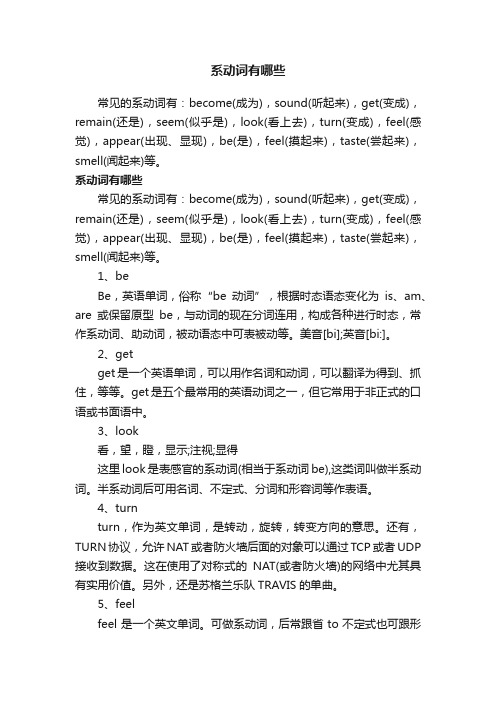
系动词有哪些常见的系动词有:become(成为),sound(听起来),get(变成),remain(还是),seem(似乎是),look(看上去),turn(变成),feel(感觉),appear(出现、显现),be(是),feel(摸起来),taste(尝起来),smell(闻起来)等。
系动词有哪些常见的系动词有:become(成为),sound(听起来),get(变成),remain(还是),seem(似乎是),look(看上去),turn(变成),feel(感觉),appear(出现、显现),be(是),feel(摸起来),taste(尝起来),smell(闻起来)等。
1、beBe,英语单词,俗称“be动词”,根据时态语态变化为is、am、are或保留原型be,与动词的现在分词连用,构成各种进行时态,常作系动词、助动词,被动语态中可表被动等。
美音[bi];英音[bi:]。
2、getget是一个英语单词,可以用作名词和动词,可以翻译为得到、抓住,等等。
get是五个最常用的英语动词之一,但它常用于非正式的口语或书面语中。
3、look看,望,瞪,显示;注视;显得这里look是表感官的系动词(相当于系动词be),这类词叫做半系动词。
半系动词后可用名词、不定式、分词和形容词等作表语。
4、turnturn,作为英文单词,是转动,旋转,转变方向的意思。
还有,TURN协议,允许NAT或者防火墙后面的对象可以通过TCP或者UDP 接收到数据。
这在使用了对称式的NAT(或者防火墙)的网络中尤其具有实用价值。
另外,还是苏格兰乐队TRAVIS的单曲。
5、feelfeel是一个英文单词。
可做系动词,后常跟省to不定式也可跟形容词或触觉;作不及物动词是感觉的意思;作系动词是觉得的意思。
系动词的分类状态系动词,用来表示主语状态,只有be一词。
如:1.He is a teacher. 他是一名教师。
2.持续系动词,用来表示主语继续或保持一种状况或态度,主要有keep, rest, remain, stay, lie, stand。
初中英语语法——感官系动词

初中英语语法——感官系动词1 系动词感官系动词是一种系动词,那么什么是系动词呢?系动词,是用来辅助主语的动词,本身有词义,但是不能直接作谓语,后面必须跟表语,常跟在系动词后做表语的有名词短语,介词短语,形容词。
常考的系动词有:be,become,get,turn,grow,go, keep(保持),seem(似乎,好像是),smell,sound,taste,feel,look等。
注意:系动词不能有被动语态,也不能用于进行时态。
【拓展】系表结构:有系动词的句子结构就叫做系表结构,用来说明物质的一个性质,而不是一个动作之类,。
如I am 、he is 等。
我们最常见的be动词am、is、are都是系动词。
此外我们学过的几个表示“变化”的词也是系动词-become, get, turn, go, grow等。
还有两个表示“保持”的keep, remain,seem, stay也是系动词。
【辨析】become,get,turn,grow,go这几个“变化”的区别①become(较正式)和get(较口语)主要是指一个人暂时性的身心变化或永久性的自然变化。
例become/get angry, mad, strong, cold, dark .②go常指由强到弱,由好到坏的状态变化。
➢The food goes bad.食物变质(馊)了。
③go后面也可接人或事物颜色的变色,此时与turn的用法相同。
④系动词turn后面多接表示颜色的形容词作表语,也可接表示天气的形容词,侧重“变得与以前完全不同”。
➢He went/turned blue with cold. 他冻得发青。
➢The leaves turn yellow in autumn. 树叶在秋天变黄。
⑤grow主要表示逐渐变化,强调变化的过程。
➢It began to grow dark。
天渐渐变得黑了。
2 感官系动词(1)定义和用法表示感觉和知觉的系动词又叫感官系动词或者感官动词,后跟形容词等构成系表结构,用来说明主语的状况性质和特征等情况。
感觉和知觉的系动词

表感觉和知觉的动词有:look, smelБайду номын сангаас, taste, sound, feel, 相当于汉语的“看上 去”、“闻起来”,“尝起来”,“听 起 来”,“摸起来”。 注意: 这类系动词与系动词be不同,其 否定形式和疑问形式的构成要加助动词 才行。如:
Does the party sound noisy? 聚会(听起来)很吵吗? The dishes don’t smell very nice to me. 这些菜我闻着并不很香。 Does he look worried? 他看起来很焦虑吗? The cake doesn’t taste delicious. 蛋糕尝起来并不好吃。
系动词(连系动词):它本身有词义, 但不能单独作谓语,后面必须跟表语构 成系表结构,说明主语的状态、性质、 特征等。 看起来 look: look smart 听起来 sound: sound noisy 表感觉 和知觉 尝起来 taste: taste delicious 的 摸起来 feel: feel soft 系动词 闻起来 smell: smell sweet
系动词的定义: 英语的动词中,有的后面要接名词或 代词等作宾语,有的单独作谓语,而 有的动词要接作表语的形容词或名词 等。我们把后面接表语的动词称为系 动词。最常用、也是同学们最熟悉的 系动词就是be;除be以外,表感觉和 知觉的动词也可以是系动词。
仔细看这些句子: The chocolate cookies smell sweet. 巧克力曲奇饼干闻起来甜甜的。 He looks angry. 他看上去很生气。 It tastes delicious. 这尝起来味道鲜美。 The shirt feels soft. 这衬衫摸上去很软。
外研版初二(下)英语第2讲:unit 1 语法篇(学生版)

Unit1语法篇__________________________________________________________________________________ __________________________________________________________________________________1.熟练掌握表示感觉和知觉的系动词表示感觉和知觉的系动词也称感官系动词1. 五个表示感觉和知觉的系动词与眼、耳、口、鼻、手相关系。
look, sound, taste, smell, feel + 形容词2. 感官系动词后可接介词like, like后常接名词。
His idea sounds like fun.3. 感官系动词的句型结构与be 不同,其否定形式和疑问形式要借助动词do。
The food tastes delicious. 变成否定句→ The food doesn't taste delicious.变成一般疑问句→ Does the food taste delicious?单项选择1.(2017山东青岛中考)The meat on the plate so delicious. Let's try it together.A. smellsB. soundsC. seesD. feels2.(2017江苏盐城中考)TFBOYS' songs sweet and many of us like listening to them.A. soundB. feelC. tasteD. look3. This silk dress so smooth. It's made in China.A. feelsB. smellsC. soundsD. tastes4.(2017内蒙古呼和浩特中考)---What do you think of the woman singer?---Her voice sounds .I like her songs.A. sweetB. sweetlyC. badD. badly5.(2017山东聊城文轩中学期中)I like the dress very much. It in the long skirt.A. feelsB. tastesC. soundsD. smells6.(2018山东潍坊中考)---What will a science museum be like if you are asked to build one? ---I hopeit will like a book.A. tasteB.soundC. lookD. smell基础演练一、选词填空(句子选词填空)look smell feel sound taste1. They tired and they didn't want to go on walking.2. The music wonderful. Play it again.3. The flowers very sweet.4. The food in the bowl delicious and I wanted some more.5. My father is very tall. He strong.二、单项选择1. --- The song beautiful. Who wrote it?--- I don't know.A. smellsB. looksC. soundsD. feels2. Is this a photo of your daughter? She looks in the red dress!A. lovelyB. happilyC. quietlyD. politely3. --- Your new dress looks so nice.--- .A. That's OKB. ThanksC. Don't say soD. Very good4. The food doesn't smell fresh, we can't eat it.A. becauseB. soC. butD. if5. Something is wrong with his . He can't hear anything.A. eyesB. earsC. handsD. nose巩固提高三、按要求转换句型1. The bananas look fresh. (改为否定句)The bananas fresh.2. The cookie tastes delicious. (改为一般疑问句)the cookie delicious?四、翻译(根据中文提示完成句子)1. 怎么了?你看上去很伤心。
表示感觉和知觉的系动词+八下module1

表示感觉和知觉的系动词定义:在动词中,有的要接名词或是代词做宾语,有的直接作谓语,而有的动词要接作表语的形容词或名词等。
我们把后面接表语的动词称为系动词。
最常用是“be”;除“be”以外,表示感觉,知觉的动词也可以是系动词。
用法:注意:(1) 表示感觉和知觉的系动词后接形容词作表语,而不接副词。
(2) 表示感觉和知觉的系动词与系动词be不同,其否定和疑问形式要借助助动词do / does / did。
单项选择。
( ) 1.—What do you think of the zongzi?—They delicious.A. soundB. tasteC. feelD. get( ) 2. Tom happy, because he lost his book.A. looksB. not lookC. doesn’t lookD. looks like( ) 3.Oh, it so nice. What beautiful music it is!A. smellsB. soundsC. tastesD. looks( ) 4.—Let’s go on a picnic this weekend, OK?—That sounds . I can’t wait to go.A. greatB.wellC. hardlyD. terrible按要求改写句子,每空一词。
5. The baby panda looks lovely. (改为一般疑问句)the baby panda lovely?6. This new song sounded beautiful last night. (改为否定句)This new song beautiful las tnight.Smell1)动词:smell gas 闻到煤气味儿Smell these sweet flowers 闻闻这些芬芳的花朵Smell out 嗅出,察觉~ a secret 察觉秘密Smell round 到处嗅,到处打听消息Smell at 对着……闻~ a bottle 对着瓶子闻一闻2)系动词:+adj smell good,smell delicious,smell sweetIt doesn’t smell fresh 它闻起来不新鲜。
常见的系动词有哪些

常见的系动词有哪些1.表感官的系动词:look, sound, taste, smell, feel(这些词用形容词作表语)2.表似乎的系动词seem, appear3.表变化的系动词:become, get, turn, grow, make, come, go, fall, run4.表依旧的系动词:remain, keep, stay, continue, stand, rest, lie, hold5.可带名词作表语的系动词:become, make, look, sound, fall, prove, remain, turn(该词后接的单数名词前多不用冠词。
如:He turned teacher.)6.如果读者对于这个语法现象还是不怎么理解的话,可以以这个名句为例子学学:the man who dies rich dies disgraced.在巨富中死去,是一种耻辱。
其中的rich and disgraced 是说明主语的性质的。
1)状态系动词用来表示主语状态,只有be一词,例如:He is a teacher. 他是一名教师。
(is与补足语一起说明主语的身份。
)2)持续系动词用来表示主语继续或保持一种状况或态度,主要有keep, rest, remain, stay, lie, stand, 例如:He always kept silent at meeting. 他开会时总保持沉默。
This matter rests a mystery. 此事仍是一个谜。
3)表像系动词用来表示"看起来像"这一概念,主要有seem, appear, look, 例如:He looks tired. 他看起来很累。
He seems (to be) very sad. 他看起来很伤心。
4)感官系动词感官系动词主要有feel, smell, sound, taste, 例如:This kind of cloth feels very soft. 这种布手感很软。
- 1、下载文档前请自行甄别文档内容的完整性,平台不提供额外的编辑、内容补充、找答案等附加服务。
- 2、"仅部分预览"的文档,不可在线预览部分如存在完整性等问题,可反馈申请退款(可完整预览的文档不适用该条件!)。
- 3、如文档侵犯您的权益,请联系客服反馈,我们会尽快为您处理(人工客服工作时间:9:00-18:30)。
表示感觉和知觉的系动词
定义:系动词:在动词中,有的要接名词或是代词做宾语,有的直接作谓语,而有的动词要接作表语的形容词或名词等。
我们把后面接表语的动词称为系动词。
最常用,也是同学们最熟悉的系动词就是“be”;除“be”以外,表示感觉,知觉的动词也可以是系动词。
单项选择。
( ) 1.—What do you think of the zongzi?
—They delicious.
A. sound
B. taste
C. feel
D. get
( ) 2. Tom happy, because he lost his book.
A. looks
B. not look
C. doesn’t look
D. looks like
【点拨】
常用的表示感觉和知觉的系动词
(2) 表示感觉和知觉的系动词与系动词be不同,其否定和疑问形式要借助助动词do / does / did。
【精练Ⅱ】
A) 单项选择。
( ) 3.Oh, it so nice. What beautiful music it is!
A. smells
B. sounds
C. tastes
D. looks
( ) 4.—Let’s go on a picnic this weekend, OK?
—That sounds . I can’t wait to go.
A. great
B.well
C. hardly
D. terrible
B) 按要求改写句子,每空一词。
5. The baby panda looks lovely. (改为一般疑问句)
the baby panda lovely?
6. This new song sounded beautiful last night. (改为否定句)
This new song beautiful las tnight.
Key:
1. B
2. C
3.B
4. A
5. Does; look
6.didn’t sound。
